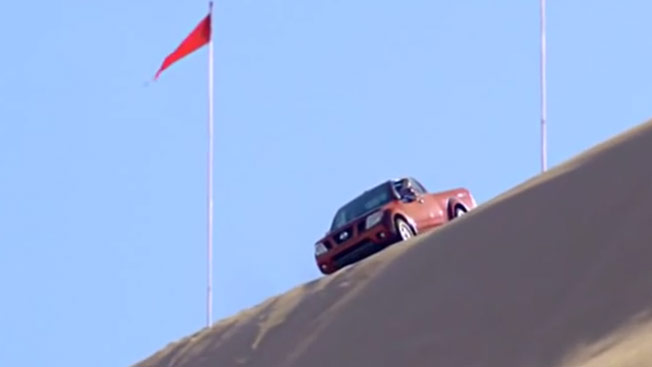"Man, no way, are you kidding?"
That line of copy, uttered by a tank-topped dude in a Nissan Frontier ad, pretty much sums up the Federal Trade Commission's take on the ad's over-the-top demonstration showing a Frontier pickup truck pushing a stalled dune buggy up a precipitous slope.
The FTC charged Nissan North America—and in a rare move, Nissan's creative agency, TBWA—with deceptive advertising for deliberately fabricating the truck's capabilities.
TBWA produced the 2011 ad called "Hill Climb" in the style of a YouTube post shot on a bystander's mobile phone. But contrary to what the viewer sees in the ad, the Frontier pickup is not actually capable of this heroic feat; both vehicles were dragged by cables that the viewer doesn't see. Even the camera angle was distorted to show a sand dune that looked a lot steeper than it really was.
"Special effects in ads can be entertaining, but advertisers can't use them to misrepresent what a product can do," said Jessica Rich, director of the FTC's bureau of consumer protection.
The FTC's case should serve as a big wake-up call to creative agencies. The law is clear that if the agency knows or has reason to know the ad was deceptive, the agency can be held liable. Though it was fairly common for the FTC to hold ad agencies liable in deceptive advertising cases in the '70s and '80s, recently it's been less common.
"This is a classic case of agency liability. Somebody was not paying attention," said Lee Peeler, the CEO of the Advertising Self-Regulatory Council and a former FTC official. "Advertising agencies need a refresher course. A lot of agencies have just gotten out of the compliance business."
The TBWA ad is similar to other FTC cases that found an agency responsible for ad deception. In 1992, the FTC fined both Volvo and Scali, McCabe, Sloves for an ad that featured a structurally reinforced Volvo holding up when a Monster truck rolled over it, while other vehicles were crushed.
Most recently, in 2002, the FTC held Campbell Mithun liable for a Wonder Bread ad that claimed the bread helps children's minds work better and helps memory.
Under the proposed settlement, TBWA, and its largest global client Nissan, agreed not to misrepresent any material quality or feature of a pickup truck. Nissan and TBWA can use special effects and other production techniques as long as they don't use the techniques to paint an inaccurate picture of a product.
The commission voted 4-0 in favor of the settlement.








